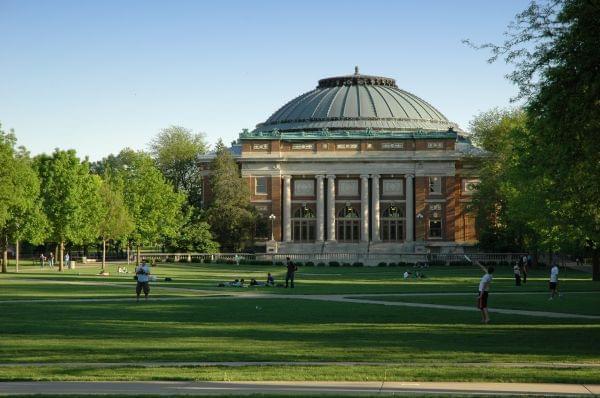Higher Ed And US-China Relationship; UChicago Journalist Subpoena; Ticks; Chicago Climate Goals 2020

Foellinger Auditorium at the University of Illinois at Urbana-Champaign Vince Smith/Flickr(CC BY-2.0)
Every year, thousands of students come to the U.S. from China to study. But now, the Chinese government is urging students to take a closer look at the risks of coming to U.S. universities. And, we're speaking with a University of Chicago student who was subpoenaed by the wealthy Pearson family after publishing news about them in the college newspaper. Plus, summer means it’s time to get outside, and maybe go for a hike. It also means a higher risk of tick bites. And, more than a decade ago, Mayor Richard M. Daley pledged that Chicago would be the “greenest city in America” by 2020. Where does that promise stand today?
The relationship between the U.S. and China affects all of our lives. If you’re a farmer or manufacturer, the Chinese market is probably a big part of your business. Even if you’re just a regular consumer, you’re affected by the economic links between the two countries.
That relationship also matters a lot to higher education. As of 2017, there were more than 360,000 college students from China in the U.S. And at the University of Illinois, more than half of the campus’s nearly 11,000 international students at the Urbana campus, come from China.
So, what happens to higher ed if the U.S.-China relationship gets worse? You know about the trade war. Yesterday, President Trump said more tariffs would be coming if Chinese President Xi Jinping didn’t attend the G20 meeting. There have also been anecdotal reports of visa delays for Chinese students. And last week, China’s Ministry of Education warned students to “step up risk assessment and prepare accordingly” if they wanted to study in the U.S.
Lindsay Ellis has been reporting on all of this and more for the Chronicle of Higher Education. She joined us from Washington DC.
Matt Rosenstein is the director of global education and training at the University of Illinois and director of the school’s Shanghai office. He was with us in our Urbana studio. Yimin Wong is the executive director of INTO Illinois State University, that’s a center at ISU that helps welcome and recruit international students.
Last fall, there were nearly 5800 students from China at @Illinois_Alma. As our trade war w/China continues - how does it affect these students - and research funding? Today's @21stShow feat. @lindsayaellis @IllinoisStateU (and U of I). Tune in at 11 CT! https://t.co/aEQchdjav0
— Niala Boodhoo (@NialaBoodhoo) June 11, 2019
Also--
Graduating college seniors have a lot on their plates: locking down a job, finishing up exams, maybe even a senior thesis.
If you’re University of Chicago student Euirim Choi though, you’re dealing with something pretty different: a subpoena filed by a wealthy family.
Choi recently served as the editor in chief of the university’s student newspaper, the Chicago Maroon. He broke the news that the Pearson family was suing the University to get back millions of dollars in donations. And now, the Pearsons are trying to force him and his colleagues to turn over documents they gathered from their reporting.
Mike Hiestand Senior Legal Counsel for the Student Press Law Center. He joined us from Washington state.
The deadline to respond to the subpoena was last Monday, and @euirim explains that they rejected it in their response.
— The 21st (@21stShow) June 11, 2019
More via @ChicagoMaroon https://t.co/sr3L9JV2N8
And--
Summer is here and for a lot of us that means more time outdoors such as hiking, walking the dog or doing work in the garden.
It also means more opportunities for tick bites. You may have already pulled one or two off yourself or a pet this season, but instead of squashing it, you can send it in to a public health research collaboration of Midwestern Universities, the CDC, and the Illinois Department of Public Health.
Last year, the program known as I-TICK received more than 900 ticks from 28 counties across the state. And, it gave us some new information about the dangers these bloodsuckers pose to our health.
Rebecca Smith is an Assistant Professor of Epidemiology at the University of Illinois and part of the I-TICK collaboration. She joined us here in our studio in Urbana.
"There were a lot of counties where we had no historical record of ticks living there, and we found ticks there." @rlsdvm_epivet @VetMedIllinois
— The 21st (@21stShow) June 11, 2019
"We also found the Gulf Coast tick as far north as Central Illinois."
Plus--
Earlier this year, Governor J.B. Pritzker signed an executive order to join the United States Climate Alliance. Concerned with the toll and rate of climate change, Governor Pritzker and 17 other governors pledged to reduce carbon emissions and get more power from renewable energy.
This was not the first time legislators here in Illinois have talked about climate change. More than a decade ago, Mayor Richard M. Daley launched the Chicago Climate Action Plan. Daley set his sights on 2020 and his plan laid out goals addressing everything from energy efficiency to emissions to recycling.
Two mayors, and twelve years later, where does Illinois’ largest city stand today when it comes to its climate goals?
Monica Eng and her team at WBEZ’s Curious City have been trying to answer that question. She joined us on the line from Chicago for more on what they’ve found.
How Is Chicago doing on 2020 climate goals?
— MarySue Barrett (@MarySueMPC) June 8, 2019
On transp., most items get a check mark...except transit ridership. Goal: increase 30%. Result: ridership down 8%. We can do better! @awennink
@WBEZCuriousCity @monicaeng @JesPup https://t.co/vYyKy1BB95

